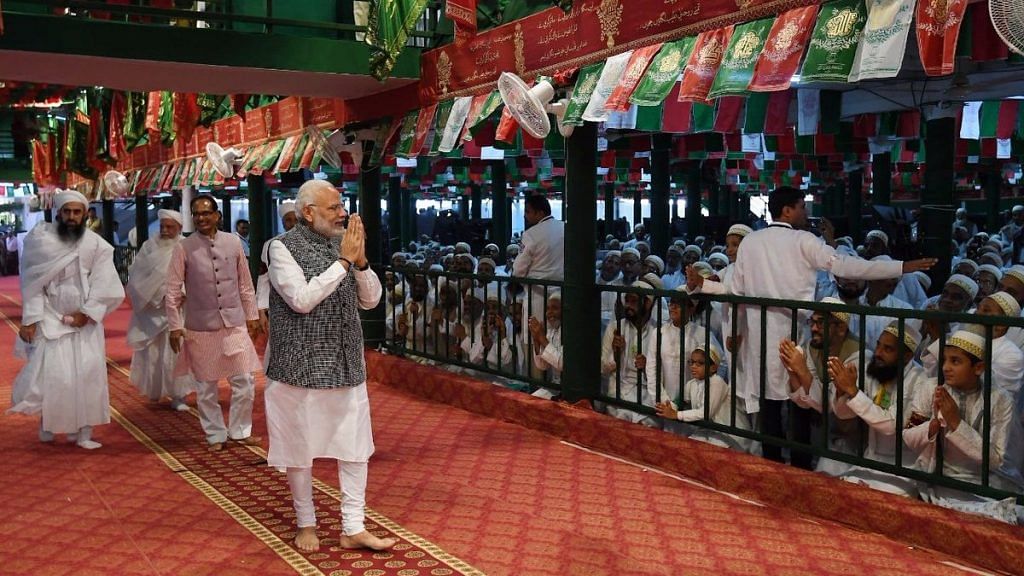Indian Muslims’ relationship with the Bharatiya Janata Party has been a hotly debated topic ever since the latter’s ascendancy to national dominance in 2014. However, of late, it appears that the BJP is trying to alter the terms of political interaction with—and its language for—Muslims. In his valedictory address at the BJP’s two-day national executive meeting in New Delhi on 17 January, Prime Minister Narendra Modi called upon party workers to reach out to the minority communities. According to media reports, the PM said that BJP workers should meet Pasmanda Muslims, the Bohra community, Muslim professionals, and educated Muslims without expecting votes in return. This comes after Modi’s similar appeal to BJP cadres in the July 2022 Hyderabad national executive — to make an outreach to the deprived sections in the minority communities.
The recent appeal has been interpreted by commentators as the BJP extending an olive branch to marginalised minority sub-groups such as Pasmanda Muslims. The party’s interest in Pasmanda Muslims is reinforced by the spree of outreach exercises that followed the Hyderabad national executive. It organised back-to-back Pasmanda meets to accord them sneh (affection) and samman (respect) in various parts of Uttar Pradesh in October and November. It fielded four candidates from the community in the December 2022 Municipal Corporation of Delhi (MCD) elections as well. As per reports, it is expected to field around 1,000 candidates from the Pasmanda Muslim community in the upcoming municipal elections in Uttar Pradesh.
What explains this change in approach? To comprehend the PM and BJP’s olive branch to marginalised Muslims, the outreach should be seen from a holistic perspective and not merely an electoral one.
Also read: Pasmanda outreach a Trojan horse for Muslims. But first, it hurts BJP’s own politics
Three factors
First, it signals a political recognition of the unaddressed social justice issues within the Indian Muslim community. Since colonial times, tensions have simmered among Muslims between Ashraafs (elite or dominant Muslims who are in minority) and Pasmandas (most backward Muslims who form the majority). The main grievance of the Pasmandas is their exclusion from power structures by the Ashraafs. The latter have been accused of prioritising religious and sentimental issues of the community — such as personal law, Babri Masjid — over the developmental concerns of the underprivileged Pasmandas. The propensity of the Ashraafs to galvanise Muslims around sentimental issues attracted favour with major political parties except the BJP. This explains why the minority Ashraafs have cornered the majority of the ‘Muslim political representation’ in various political parties. The Muslim intelligentsia and civil society should also shoulder some responsibility for letting this anomaly perpetuate by failing to effectively bring Muslim identity differentials to the political fore.
Second, it represents an explicit political outreach to a Muslim sub-group that has been under-represented in other political parties. In doing so, the BJP has set itself apart from those who have neglected the caste factor among Muslims and instead focussed on their religious identity.
Third, it indicates that the BJP’s engagement with the Muslims will be through the underprivileged Pasmanda Muslims and not only through the privileged elite. Experts have noted that elite and dominant Ashraaf Muslims are the most vocal critics of the BJP, and hence, the party has decided to focus on the Pasmandas. Unlike the Ashraafs, the Pasmandas do not dismiss the prospects of aligning with the BJP. Rather, they are open to supporting any political party that is ready to acknowledge their deprivation and willing to work for their upliftment.
This argument aligns with the PM’s resolve of “Sabka saath, sabka vikas, sabka vishwas, sabka prayas”. The central theme of Modi’s voter outreach is that welfarism without discrimination is a political duty of the government. In fact, figures suggest that in several flagship schemes, Pasmanda Muslims have benefitted in a proportion larger than their population. For instance, while UP has around 20 per cent Muslims — within which Pasmandas are in majority — nearly 35 per cent of them are beneficiaries of the Pradhan Mantri Awas Yojana, 37 per cent of the Pradhan Mantri Ujjwala Yojana, and 30 per cent of Pradhan Mantri Mudra Yojana. These Pasmanda Muslims benefit from these schemes without discrimination. Similarly, the One District One Product scheme has benefitted numerous Pasmanda artisans like chhipis (printers), mansuris (cotton carders), mochis (shoemakers), kumhars (potters). As an economically marginalised class, the Pasmandas form a specific category of beneficiaries under these schemes.
Also read: Return of the Muslim: From Modi ‘sermon’ to Pathaan to Bharat Jodo Yatra
A momentous first
The BJP, in order to expand its footprint, is naturally also trying to ameliorate the Pasmandas in its vote base, especially in UP and Bihar. The party has been buoyed by its recent wins in Rampur and Azamgarh Lok Sabha by-elections. These constituencies have a significant Pasmanda population. It is to be seen if these victories, combined with BJP’s rigorous outreach, have a knock-on effect in the times to come.
Whatever the outcome, the outreach represents a watershed moment in the history of Indian politics. For the Pasmandas, it marks a momentous first that a national political party has extended an olive branch to them. Further, it is an opportunity for them to dispel the long-standing notion of uniformity of sentiment or interest among Indian Muslims. For the BJP, it marks their first earnest effort to accommodate Muslims — perhaps the only community beyond its grasp so far. For PM Modi, it’s a reinforcement that social justice, inclusion, and welfare for all will be the guiding principles of the New India.
Tariq Mansoor is Vice-Chancellor of Aligarh Muslim University. He tweets @ProfTariqManso1. Views are personal.
(Edited by Humra Laeeq)
